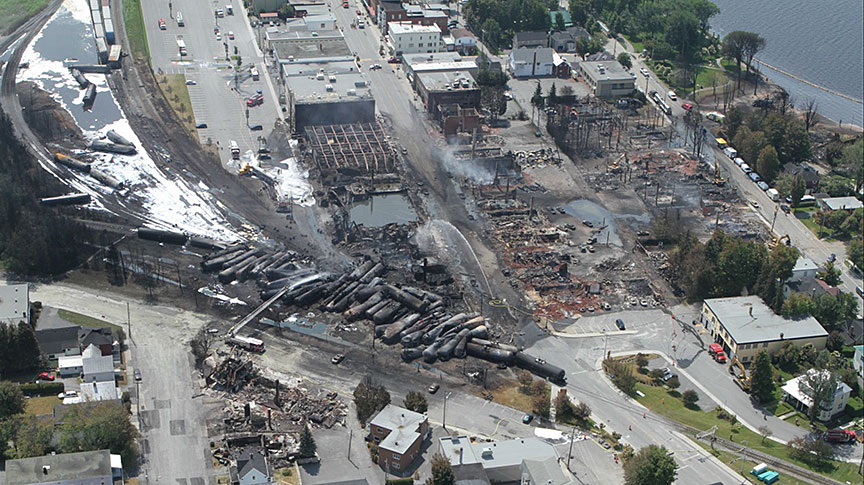The full report is available to download from the TSB’s website.
This summary of the Transportation Safety Board of Canada’s (TSB) Railway Investigation Report R13D0054 contains a description of the accident, along with an overview of the analysis and findings, the safety action taken to date, five key recommendations, and what more needs to be done to help ensure an accident like this does not happen again.
[…]
Shortly after the engineer left, the Nantes Fire Department responded to a 911 call reporting a fire on the train. After shutting off the locomotive’s fuel supply, the firefighters moved the electrical breakers inside the cab to the off position, in keeping with railway instructions. They then met with an MMA employee, a track foreman who had been dispatched to the scene but who did not have a locomotive operations background.
Once the fire was extinguished, the firefighters and the track foreman discussed the train’s condition with the rail traffic controller in Farnham, and departed soon afterward. With all the locomotives shut down, the air compressor no longer supplied air to the air brake system. As air leaked from the brake system, the main air reservoirs were slowly depleted, gradually reducing the effectiveness of the locomotive air brakes. Just before 1 a.m., the air pressure had dropped to a point at which the combination of locomotive air brakes and hand brakes could no longer hold the train, and it began to roll downhill toward Lac-Mégantic, just over seven miles away.
[…]
Almost all of the 63 derailed tank cars were damaged, and many had large breaches. About six million litres of petroleum crude oil was quickly released. The fire began almost immediately, and the ensuing blaze and explosions left 47 people dead. Another 2000 people were forced from their homes, and much of the downtown core was destroyed.
The pileup of tank cars, combined with the large volume of burning petroleum crude oil, made the firefighters’ job extremely difficult. Despite the challenges of a large emergency, the response was well coordinated, and the fire departments effectively protected the site and ensured public safety after the derailment.
Published on 19 Aug 2014
Animation – Sequence of events in the Lac-Mégantic derailment and fire
On 6 July 2013, a unit train carrying petroleum crude oil operated by Montreal, Maine & Atlantic Railway (MMA) derailed numerous cars in Lac-Mégantic, Quebec, and a fire and explosions ensued.




